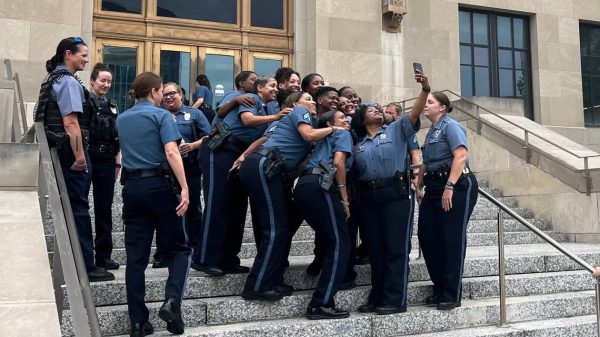Okerstrom shares story of living legend, veteran in new book
At 10:37 a.m., Park University English professor Dennis Okerstrom stands before his class explaining the importance of film. With a stature of no more than five feet, four inches, he bounds from one side of a desk to the other, adjusting his grey sweater in a moment of silence. Then it happens.
“Well, I’m standing on a corner in Winslow, Arizona and such a fine sight to see,” he sings. With no warning and no hesitation, Okerstrom belts out the classic Eagles song. “You guys know the song right? Sing with me,” he says.
After multiple attempts to construct a choir, he makes his point.
“Now, write about it and make me feel exactly the way I just made you feel,” he tells the class. While the students gaze, baffled at their papers, Okerstrom’s vision becomes clear – he plead a case for filmmaking.
While many would find this experience unpredictable, they must realize so is Okerstrom, who owns a fighter plane from World War II and used his sabbatical in Fall 2014 to write about an American hero who has long refused to have his story told.
According to Okerstrom, Richard E. Cole, from Dayton, Ohio, appears to be a regular American man walking down the street. A passerby would never suspect that 73 years ago, Cole would end up taking part in three of the most honored events of World War II.
The first, “The Doolittle Raid,” completed only four short months after Pearl Harbor, was the very first air raid that occurred on Japanese soil. It boosted U.S. morale, produced doubt in the Japanese military and came with its share of sacrifice – eight men were captured, three of which were executed, Okerstrom said.
The second was what allied pilots liked to call “The Hump,” which was the plan to fly through the Himalayan Mountains from both China and India to deliver supplies to the war effort in China.
In 1940, this was no minor task. Planes were not equipped or reliable enough to fly at that altitude.
In fact, Okerstrom said, more lives were lost in that mission than those bombing Germany but Cole did it and history says he did it well.
Well enough, in fact, that Cole was relieved from service for what Okerstrom said was only three short months before he was contacted to play a role in the 1st Air Commandos.
It was an operation authorized behind Japanese lines and far fewer men were provided than originally hoped for. It turned to be a small elite, including none other than Cole himself.
American History has awarded this man the title of a hero for most of his near 100 years of life but he’s refused praise, according to Okerstrom, crowning his dismissal by saying, “I was just doing my job.”
True to form, he has refused being idolized, bragged about and even written about.
But, Okerstrom stepped up to the plate and accepted this challenge.
After meeting Cole during the creation of a different book, Project 9, Okerstrom began his attempt to approach the story.
“Two years ago I talked to his daughter about [writing the story],” he said. “All she could do was wish me luck. I called him and he immediately started telling me no, and I said, ‘stop right there, this is my phone call, I get to finish before you tell me no. You’re not a hero, I understand you were doing your job but you served with a lot of heroes that didn’t make it. Who tells their story?’”
After hesitation and personal conflict, Cole cautiously agreed. From there, Okerstrom’s voyage began.
“He started sharing old letters, things even his daughter had never seen,” Okerstrom said. “She didn’t know how I did it.”
Okerstrom is no stranger to challenging stories and peculiar paths when it comes to writing. His other books are also glimpses into World War II. This is no accident.
“My father was in World War II, the 8th Air Force Unit, and he married an English girl, my mother,” he said.
Okerstrom explained that being raised with these stories, hearing about “The Mighty 8th” and others made continuing the storytelling tradition an effortless task.
“The more vets I meet the more blown away I am and I realized that no one’s telling their stories,” he said. “When they go, so do the stories.”
According to Okerstrom, World War II veterans are dying at a rate of 1,500 a day. There were 16 million U.S. veterans, according to Okerstrom, now less than 25 percent are still living. The Veterans Association produces a similarly high number.
Taking the job of passing on legendary war stories is a daunting task, which Okerstrom said involves “an ungodly amount of research” along with dedication.
The dedication to complete the story must be the most important part of his life, he said.
“I like to control the sequence of events and find something to put the reader where they don’t know if they’ll survive,” said Okerstrom.
Through explanation he compares and finds it in many ways similar to controlling the action in a movie.
“Find the moment in the story when human beings are the most vulnerable and take it from there,” he said.
“What was the weather like? What were they wearing? Details bring it alive.”
Though some may call storytelling of this caliber a gift, the burden is far from light.
“To tell you the truth,” Okerstrom said, “when I’m invited to read sections of my book, I have to be selective of what I read. In some places I still tear up.”
Despite emotional strife, Okerstrom is well prepared to handle the complexities of such stories.
“Vietnam was the war of my time,” he said. “I know flying, I can visualize it; I can see the planes bucking. Pilots know what planes they like and which they don’t. We know how to talk to each other.”
Cole is a man among many men of war, according to Okerstrom.
“This is not to glorify war,” he said. “If anything it’s to show the repercussions of going into a war. It’s the aftermath.
The last thing I did on my sabbatical was talk to Leavenworth High School kids about interviewing veterans. One of the teachers there said, ‘Well my dad was in World War II’ so of course I interviewed him immediately,” Okerstrom said.
Despite years of research, Okerstrom is still amazed by the stories of veterans. When Okerstrom interviewed the now 90-year-old man he learned about in Leavenworth, he continued to unveil the harsh realities of war.
“He was so young going into war that he became a Commission Officer and a pilot came back and still was too young to vote in the country he fought for. Can you believe that? Don’t ask young boys to go to war for you because they’ll do it and they’ll pay the price for the rest of their lives.”
As this story has been pieced together, one of the last men that was involved in the “Doolittle Raid” has passed away.
Now only three remain.
Okerstrom ambles through Copley Hall at Park University, defying the gravity of the thousands of stories he carries around in his pockets.
Your donation will support the student journalists of Park University. Your contribution will allow us to cover our annual website hosting costs, freeing up other funds for equipment, printing and training.







